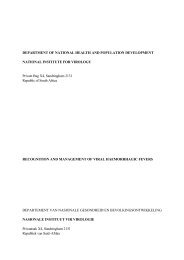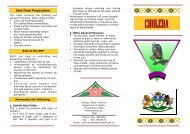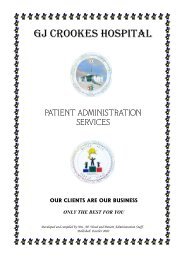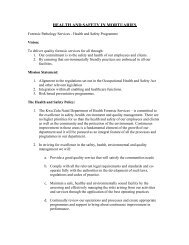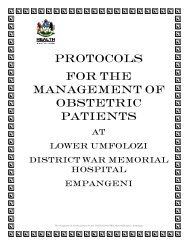Stanger Hospital Eye Care Centre.
Stanger Hospital Eye Care Centre.
Stanger Hospital Eye Care Centre.
Create successful ePaper yourself
Turn your PDF publications into a flip-book with our unique Google optimized e-Paper software.
<strong>Stanger</strong> <strong>Hospital</strong> <strong>Eye</strong> <strong>Care</strong> <strong>Centre</strong>.
CATARACT<br />
SURGERY<br />
YOUR<br />
QUESTIONS<br />
ANSWERED
YOUR QUESTIONS ANSWERED AFTER CATARACT SURGERY<br />
You are soon to be admitted to hospital to have your cataract<br />
removed. This booklet is designed to provide the necessary<br />
information regarding your admission to hospital, the operation<br />
and its aftercare.<br />
Having a cataract removed should not disrupt your life greatly,<br />
but some extra care is required for at least three weeks after<br />
surgery. During this time, your eye is still fragile and could be<br />
vulnerable to the smallest knock.(slightest injury)<br />
We suggest, if possible that you arrange for some one to help at<br />
home during the first 3 weeks after discharge. Overleaf are some<br />
guidelines to help identify your limitations and understand why<br />
these limitations are necessary.<br />
WHAT IS A CATARACT?<br />
The natural lens of the eye is a transparent flexible structure<br />
suspended within the eye.<br />
In many older people, however, and in a few younger people, the<br />
lens gradually becomes cloudy and discolored, preventing clear<br />
vision. This tends to become worsen, usually over a few<br />
years .Often both eyes are affected and the patient will become<br />
more visually handicapped. In the early stages, a change of<br />
glasses may help, but eventually a cataract operation is needed.
PRE-OPERATIVE ASSESSMENT:<br />
Once your name is on the waiting list for cataract surgery, you<br />
will be called to a pre-operative assessment clinic one month<br />
before the cataract surgery. This is to assess your fitness for<br />
cataract surgery and any special factors that may affect the way<br />
the operation will be done. The following tests will be conducted<br />
before we admit you for cataract surgery.<br />
Tests are;<br />
• Blood sugar.<br />
• Blood pressure.<br />
• E.C.G for any significant heart diseases and patients who<br />
are above 45 years and undergoing general anesthesia.<br />
Please note that any abnormality in the above mentioned test<br />
will delay or cancel your admission.<br />
Therefore make sure that your blood pressure and blood sugar<br />
is well controlled. Your blood sugar should be below 7 mmol/l<br />
for 3 months consecutive readings. Please feel free to ask<br />
questions and express your concerns.<br />
HOW CATARACT SURGERY IS DONE:<br />
The operation takes about 30 to 45 minutes and is done under<br />
local anesthesia (the patient remaining awake throughout the<br />
procedure). While lying on the operating tables please lie very<br />
still and listen to the doctor’s orders to avoid complications.<br />
(i.e. do not cough, sneeze, talk or move the head)<br />
POST-OPERATIVE ASSESMENT AND RECOVERY:<br />
At the end of the operation you will return to the ward and after<br />
one hour you allowed to eat a soft diet.<br />
Prior to going home, you will be shown how to wash your eye<br />
and instill your eye drops. The patent is usually able to go home
next day afternoon and we would advise you to have an adult<br />
relative or friend give you company on the first night at home.<br />
Most patients will then notice an improvement in brightness and<br />
color, although quite often the vision is also somewhat misty or<br />
out of focus at first. A period of healing is then required.<br />
Usually there is very little post operative pain, the eye may feel<br />
bruised at first and a “gritty feeling” is common in the first few<br />
days. Normal “over the counter” analgesics (pain killers) will<br />
usually suffice.<br />
The area around the eye may look bruised, and the white area of<br />
eye may look red at first. This is not a cause for concern and will<br />
clear up within 2 to 3 weeks.<br />
Post operative eye drops will be supplied to you and a plastic<br />
eye shield for use at night for three weeks following surgery.<br />
You can return to most ordinary activities after 2 weeks,<br />
however bending and lifting are usually not permitted.<br />
Things you must avoid for 3 weeks ……………<br />
1. Touching or rubbing the operated eye.<br />
2. Heavy gardening (e.g. Digging)<br />
3. Carrying heavy shopping bags.<br />
4. Dusty housework.<br />
5. Swimming and contact sports.<br />
6. Getting soap or shampoo in the eye.<br />
7. Driving unless you have confirmed that you are within the<br />
legal limit to drive.<br />
8. Traveling abroad before your 1 st follow up appointment.<br />
When can I return to work?<br />
This really depends on the work you do. Discuss this at your<br />
pre-operative assessment clinic visit. Your sight will not be at its<br />
best until your eyes are refracted for a new pair of spectacles<br />
usually after 3 months.
<strong>Care</strong> needs to be taken when…..<br />
• Hair washing (use shield for protection).<br />
• Bending<br />
• Cooking.<br />
Things are not affected…..<br />
• Walking<br />
• Watching television<br />
• Most normal daily activities<br />
• Reading<br />
Follow-up appointment…..<br />
Usually your first follow-up appointment will be one week after<br />
the surgery. Your second follow-up appointment will be three<br />
weeks after the first follow-up. If no post–operative complication,<br />
then you will be discharge on that day after a refraction test if<br />
needed. If you have any problems before your follow-up<br />
appointment then you should phone <strong>Eye</strong> clinic nurse for advice<br />
on 032-4376188.<br />
WHAT ARE THE RISKS?<br />
All operations carry some element of risk; cataract surgery in<br />
our <strong>Stanger</strong> hospital setup with its limitation which includes<br />
post operative non-compliance by the patients, we find about<br />
90% patient experience an improvement in sight, 8% end up with<br />
the same level of sight as before, and 2% are sadly worse off<br />
because of complications.<br />
Some time due to unwanted post operative complications one in<br />
100 cataract surgery patient may lose all of the sight in the eye.<br />
Disease like diabetes, hypertension or any other pre-existing eye<br />
diseases in addition to the cataract, can affect the final visual<br />
outcome, as the presence of a cataract limits a full examination<br />
of the eye before surgery.
We hope you will gain lasting benefit from your cataract<br />
operation, and we will try to make it as “stress free” as possible.<br />
HOW TO APPLY YOUR EYE DROPS<br />
WASH YOUR HANDS BEFORE APPLYING EYE DROPS<br />
NEVER PUT MEDICATION BY YOURSELF,<br />
ALWAYS ASK SOME ONE TO PUT IT IN YOUR EYE.<br />
1. Gently pull the lower eyelid down until there is a small<br />
pocket.<br />
2. Squeeze the upturned dropper bottle to release a<br />
drop into your eye. Avoid touching the tip of the<br />
bottle against your eye.<br />
DO NOT RUB YOUR EYES AFTER APPLYING THE DROPS.
STORAGE OF EYE DROPS AND OINTMENT<br />
1. Store eye drops and ointments in a cool place out of<br />
children’s reach.<br />
2. Only store drops in the fridge if requested to do so.<br />
3. Dispose of all opened eye drops and ointments after one<br />
month.<br />
4. Never share your eye drops with any one else.<br />
Compiled by.<br />
Dr.Chowdhury<br />
Chief Medical Officer.<br />
<strong>Stanger</strong> hospital eye care <strong>Centre</strong>.



